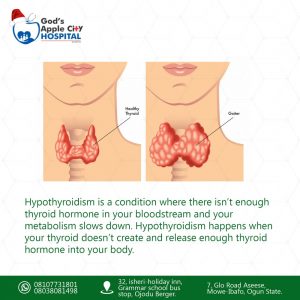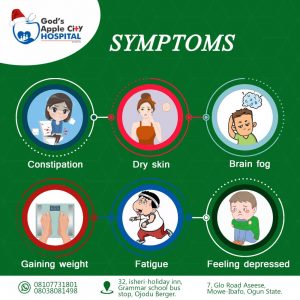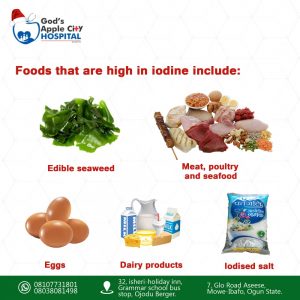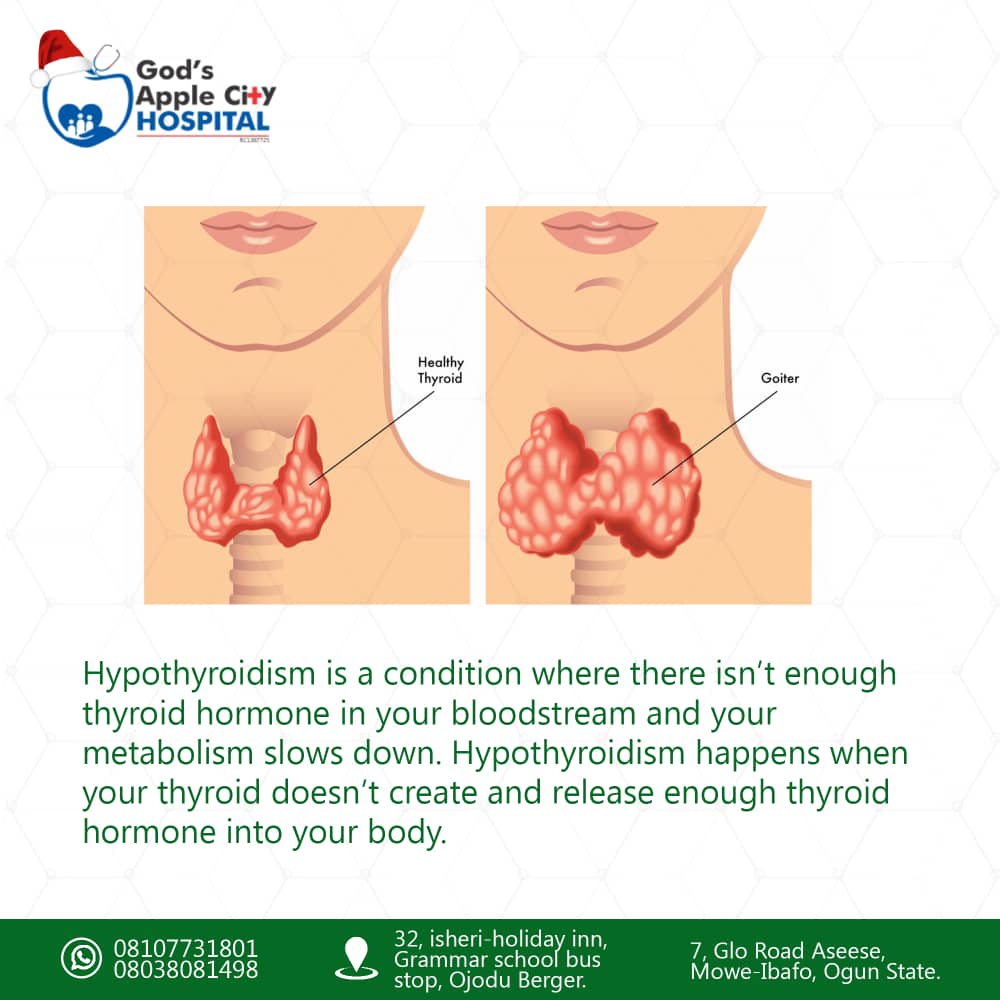Hypothyroidism
Hypothyroidism is a condition where there isn’t enough thyroid hormone in your bloodstream and your metabolism slows down.
Hypothyroidism happens when your thyroid doesn’t create and release enough thyroid hormone into your body. This makes your metabolism slow down, affecting you entire body. Also known as underactive thyroid disease, hypothyroidism is fairly common.
When your thyroid levels are extremely low, this is called myxedema. A very serious condition, myxedema can cause serious symptoms, including:
- A low body temperature
- Anemia
- Heart failure
- Confusion.
- Coma.
This severe type of hypothyroidism is life-threatening.
In general, hypothyroidism is a very treatable condition. It can be controlled with regular medications and follow-up appointments with your healthcare provider.

How does my thyroid work?
The thyroid gland is a small, butterfly-shaped organ located in the front of your neck just under the voice box (larynx). Picture the middle of the butterfly’s body centered on your neck, with the wings hugging around your windpipe (trachea). The main job of the thyroid is to control your metabolism. Metabolism is the process that your body uses to transform food to energy your body uses to function. The thyroid creates the hormones T4 and T3 to control your metabolism. These hormones work throughout the body to tell the body’s cells how much energy to use. They control your body temperature and heart rate.
When your thyroid works correctly, it’s constantly making hormones, releasing them and then making new hormones to replace what’s been used. This keeps your metabolism functioning and all of your body’s systems in check. The amount of thyroid hormones in the bloodstream is controlled by the pituitary gland, which is located in the center of the skull below the brain. When the pituitary gland senses either a lack of thyroid hormone or too much, it adjusts its own hormone (thyroid stimulating hormone, or TSH) and sends it to the thyroid to balance out the amounts.
If the amount of thyroid hormones is too high (hypothyroidism) or too low (hypothyroidism), the entire body is impacted.
Who is affected by hypothyroidism?
Hypothyroidism can affect people of all ages, genders and ethnicities. It’s a common condition, particularly among women over age 60. Women are generally more likely to develop hypothyroidism after menopause than earlier in life.
What’s the difference between hypothyroidism and hyperthyroidism?
In hypothyroidism, the thyroid doesn’t make enough thyroid hormone.
The difference between hypothyroidism and hyperthyroidism is quantity. In hypothyroidism, the thyroid makes very little thyroid hormone. On the flip side, someone with hyperthyroidism has a thyroid that makes too much thyroid hormone. Hyperthyroidism involves higher levels of thyroid hormones, which makes your metabolism speed up. If you have hypothyroidism, your metabolism slows down.
Many things are the opposite between these two conditions. If you have hypothyroidism, you may have a difficult time dealing with the cold. If you have hyperthyroidism, you may not handle the heat. They are opposite extremes of thyroid function. Ideally, you should be in the middle. Treatments for both of these conditions work to get your thyroid function as close to that middle ground as possible.
What causes hypothyroidism?
Hypothyroidism can have a primary cause or a secondary cause. A primary cause is a condition that directly impacts the thyroid and causes it to create low levels of thyroid hormones. A secondary cause is something that causes the pituitary gland to fail, which means it can’t send thyroid stimulating hormone (TSH) to the thyroid to balance out the thyroid hormones.
Primary causes of hypothyroidism are much more common. The most common of these primary causes is an autoimmune condition called Hashimoto’s disease. Also called Hashimoto’s thyroiditis or chronic lymphocytic thyroiditis, this condition is hereditary (passed down through a family). In Hashimoto’s disease, the body’s immune system attacks and damages the thyroid. This prevents the thyroid from making and releasing enough thyroid hormone.
The other primary causes of hypothyroidism can include:
- Thyroiditis (inflammation of the thyroid).
- Treatment of hyperthyroidism (radiation and surgical removal of the thyroid).
- Iodine deficiency (not having enough iodine — a mineral your thyroid uses to make hormones – in your body).
- Hereditary conditions (a medical condition passed down through your family).
In some cases, thyroiditis can happen after a pregnancy (postpartum thyroiditis) or a viral illness.
What causes hypothyroidism in pregnancy?
In most cases, women with hypothyroidism during pregnancy have Hashimoto’s disease. This autoimmune disease causes the body’s immune system to attack and damage the thyroid. When that happens, the thyroid can’t produce and release high enough levels of thyroid hormones, impacting the entire body. Pregnant women with hypothyroidism may feel very tired, have a hard time dealing with cold temperatures and experience muscles cramps.
Thyroid hormones are important to your baby’s development while in the womb. These hormones help develop the brain and nervous system. If you have hypothyroidism, it’s important to control your thyroid levels during pregnancy. If your baby doesn’t get enough thyroid hormone during development, the brain may not develop correctly and there could be issues later. Untreated or insufficiently treated hypothyroidism during pregnancy may lead to complications like miscarriage or preterm labor.
Does birth control affect my thyroid?
When you’re on birth control pills, the estrogen and progesterone inside of the pills can affect your thyroid-binding proteins. This increases your levels. If you have hypothyroidism, the dose of your medications will need to be increased while you’re using birth control pills. Once you stop using birth control pills, the dosage will need to be lowered.
Can hypothyroidism cause erectile dysfunction?
In some cases, there can be a connection between untreated hypothyroidism and erectile dysfunction. When your hypothyroidism is caused by an issue with the pituitary gland, you can also have low testosterone levels. Treating hypothyroidism can often help with erectile dysfunction if it was directly caused by the hormone imbalance.
What are the symptoms of hypothyroidism?
The symptoms of hypothyroidism usually develop slowly over time sometimes years. They can include:
- Feeling tired (fatigue).
- Experiencing numbness and tingling in your hands.
- Having constipation.
- Gaining weight.
- Experiencing soreness throughout your body (can include muscle weakness).
- Having higher than normal blood cholesterol levels.
- Feeling depressed.
- Being unable to tolerate cold temperatures.
- Having coarse skin dry, and hair.
- Experiencing a decrease sexual interest.
- Having frequent and heavy menstrual periods.
- Seeing physical changes in your face (including drooping eyelids, as well as puffiness in the eyes and face).
- Having your voice becomes lower and hoarser.
- Feeling more forgetful (“brain fog”).

Will hypothyroidism make me gain weight?
If your hypothyroidism is not treated, you could gain weight. Once you are treating the condition, the weight should start to lower. However, you will still need to watch your calories and exercise to lose weight. Talk to your healthcare provider about weight loss and ways to develop a diet that works for you.
Hypothyroidism diagnosed?
It can actually be difficult to diagnose hypothyroidism because the symptoms can be easily confused with other conditions. If you have any of the symptoms of hypothyroidism, talk to your healthcare provider. The main way to diagnose hypothyroidism is a blood test called the thyroid stimulating hormone (TSH) test. Your healthcare provider may also order blood tests for conditions like Hashimoto’s disease. If the thyroid is enlarged, your provider may be able to feel it during a physical exam during an appointment.
How is hypothyroidism treated?
In most cases, hypothyroidism is treated by replacing the amount of hormone that your thyroid is no longer making. This is typically done with a medication. One medication that is commonly used is called levothyroxine. Taken orally, this medication increases the amount of thyroid hormone your body produces, evening out your levels.
Hypothyroidism is a manageable disease. However, you will need to continuously take medication to normalize the amount of hormones in your body for the rest of your life. With careful management, and follow-up appointments with your healthcare provider to make sure your treatment is working properly, you can lead a normal and healthy life.
What happens if hypothyroidism is not treated?
Hypothyroidism can become a serious and life-threatening medical condition if you do not get treatment from a healthcare provider. If you are not treated, your symptoms can become more severe and can include:
- Developing mental health problems.
- Having trouble breathing.
- Not being able to maintain a normal body temperature.
- Having heart problems.
- Developing a goiter (enlargement of the thyroid gland).
You can also develop a serious medical condition called myxedema coma. This can happen when hypothyroidism isn’t treated.
Will I have the same dose of medication for hypothyroidism my entire life?
The dose of your medication can actually change over time. At different points in your life, you may need to have the amounts of medication changed so that it manages your symptoms. This could happen because of things like weight gain or weight loss. Your levels will need to be monitored throughout your life to make sure your medication is working correctly.
Can hypothyroidism be prevented?
Hypothyroidism cannot be prevented. The best way to prevent developing a serious form of the condition or having the symptoms impact your life in a serious way is to watch for signs of hypothyroidism. If you experience any of the symptoms of hypothyroidism, the best thing to do is talk to your healthcare provider. Hypothyroidism is very manageable if you catch it early and begin treatment.
Are there any foods I can eat to help my hypothyroidism?
Most foods in western diets contain iodine, so you do not have to worry about your diet. Iodine is a mineral that helps your thyroid produce hormones. One idea is that if you have low levels of thyroid hormone, eating foods rich in iodine could help increase your hormone levels. The most reliable way to increase your hormone levels is with a prescription medication from your healthcare provider. Do not try any new diets without talking to your provider first. It’s important to always have a conversation before starting a new diet, especially if you have a medical condition like hypothyroidism.
Foods that are high in iodine include:
- Eggs.
- Dairy products.
- Meat, poultry and seafood.
- Edible seaweed.
- Iodized salt.
Work with your healthcare provider or a nutritionist (a healthcare provider who specializes in food) to craft a meal plan. Your food is your fuel. Making sure you are eating foods that will help your body, along with taking your medications as instructed by your healthcare provider, can keep you healthy over time. People with thyroid condition should not consume large amounts of iodine because the effect may be paradoxical (self-contradictory).

Can hypothyroidism go away on its own?
In some mild cases, you may not have symptoms of hypothyroidism or the symptoms may fade over time. In other cases, the symptoms of hypothyroidism will go away shortly after you start treatment. For those with particularly low levels of thyroid hormones, hypothyroidism is a life-long condition that will need to be controlled with medication on a regular schedule. It can be controlled very well and you can live a normal life with hypothyroidism.
.
.
.
.
.
.
https://web.facebook.com/Godsapplecity
read other blogs

